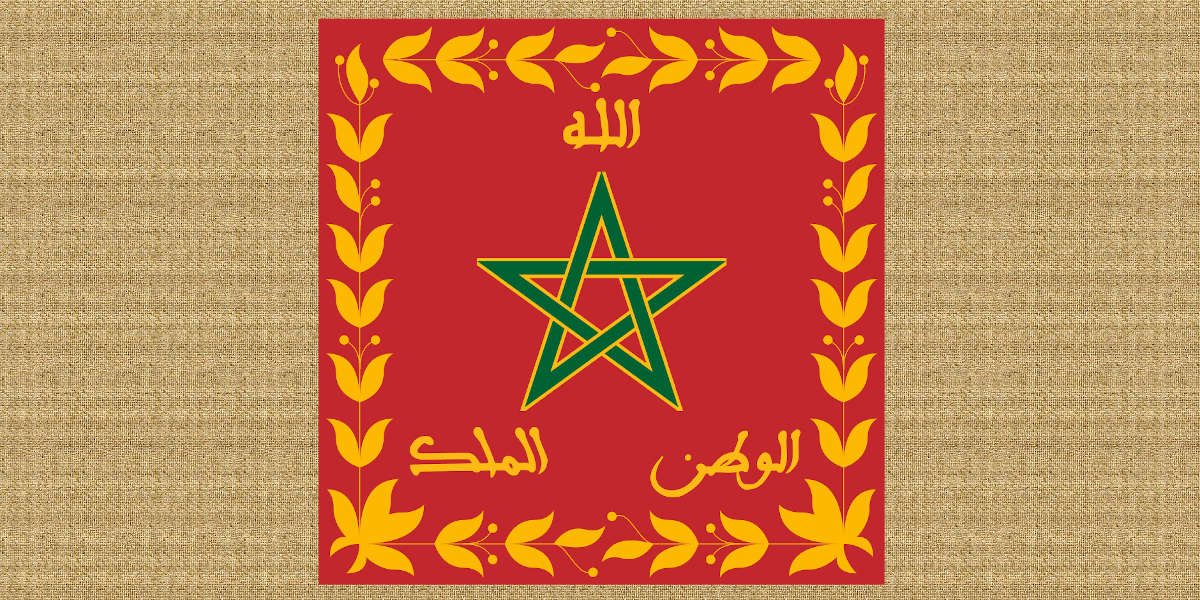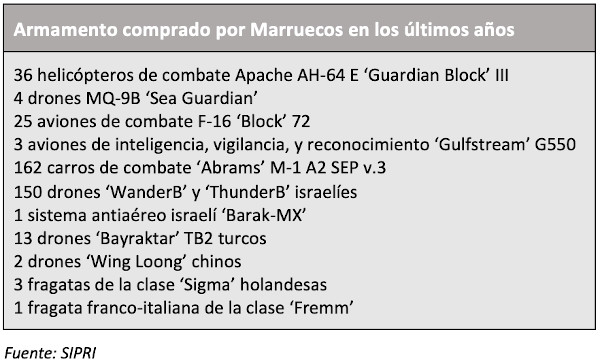Algeria-Morocco rivalry
Despite this abundant purchase of arms by Morocco, Algeria continues to be the first military budget of all Africa, and the third if the countries of the Middle East are also taken into account. However, Morocco has gained international importance in areas of Algerian interest such as the Sahel, where successive coups d'état have led both North African countries to take positions in the various conflicts.
Algeria is at a crossroads in its international policy: Morocco, its rival, is betting on a rearmament policy in which the quality of material takes precedence over its quantity, with the United States and Israel playing a preponderant role in the process; meanwhile, Algeria's main supplier, Russia, from which it has traditionally obtained 90% of its armaments, is immersed in the war in Ukraine and is not in a position to continue sending technicians and military material, which limits Algiers' options, which is therefore seeking to diversify its source market with the option of China. In line with this policy, Algiers and Beijing agreed on licence for the manufacture of Chinese light weapons on Algerian territory. For its part, the United States presents itself as the main arms supplier to Morocco, with which since 2018 it has signed a series of agreements on state-of-the-art weaponry that could put the Moroccan army one step ahead of its rivals in the region.
Surprisingly, Israel appears here as another major player. Following the signature of the Abraham Accords in 2020, by which the Trump administration got countries such as the United Arab Emirates to formalize their relations with Israel, Morocco also initiated a rapprochement that ended with the recognition of the Jewish State, in exchange for Jewish recognition of Moroccan claims to the territory of Western Sahara, and the opening of a path of cooperation in subject of armaments. The purchase of drones from Israel (there is even speculation that they will be manufactured in Moroccan territory), as well as anti-aircraft systems, and the arrival of Israeli military experts in the North African country, have strengthened relations between the two states, although it remains to be seen how the Gaza conflict will affect bilateral relations. For the time being, it seems that diplomatic contacts continue to be fluid and no substantial change is expected, but the conflict poses a risk to be taken into account.
Spain, at the crossroads
Spain, for its part, finds itself in a complicated status . It is true that the increase of its military budget takes place in the European context of concern about the war in Ukraine; however, the Iberian country should not forget its southern flank, especially after the change of position on Western Sahara. The recognition in 2022 of Moroccan sovereignty over the Sahara meant for Spain a serious crisis of institutional relations with Algeria, which still has suspended the Treaty of Friendship and Cooperation between the two countries. Energy policy has also been affected, since Algeria closed the Maghreb-Europe gas pipeline, alleging the bad relations it maintains with the Alaouite monarchy, which also ended up affecting Spain at a time when Algerian gas was becoming essential in Europe after the outbreak of the war in Ukraine.
At this juncture, in which Madrid has prioritized its ties with Rabat over those with Algiers, Spain has obtained few benefits and a few concerns from Morocco. Although it is evident that the migratory flow in the autonomous cities of Ceuta and Melilla has been very limited, which would not be possible without the partnership of the Moroccan government, it is also evident that the same government does not lose any opportunity to claim both cities as part of its territory, so that everything related to the two places continues to be a source of irritation in Spanish-Moroccan relations.
The waters of the exclusive economic zone of the Canary Islands are another point of conflict. Within that area (up to 200 nautical miles from the baselines of the territorial sea) deposits of rare earths have been discovered and the possibility of the existence of other resources, such as oil, is being considered. Morocco and Spain disagree on where the boundary of their respective exclusive economic zones should be established and are bound to negotiate.
It may be thought that Spain has obtained very little in return for its turn in something as transcendental as the Western Sahara, especially after the resurgence of the Atlantic migratory route to the Canary Islands.
In the framework of the Wales Summit commitment, and in the context of the war in Ukraine, Spain has increased its Defense budget , which enables it to initiate a cycle of acquisitions that will have an impact on the Spanish projection on the Maghreb. Thus, the recent purchase of 20 new EF-2000 "Eurofighter" aircraft will allow the renewal of the F-18s stationed in the Canary Islands, considered a priority within the national security strategy.
Morocco's purchase from the United States of 18 HIMARS systems and 112 surface-to-surface missiles (including 40 ATACMS) prompted Spain to react, as it did not have any of these high artillery rocket systems in its arsenal mobility. In October 2023, the Spanish government approved an allocation of 527.5 million euros to fill this gap through a national program that will use Israeli PULS technology (a rocket launcher system similar to HIMARS).
The Moroccan purchases of the M-1 'Abrams' or F-16 tanks mentioned above do not represent a substantial competitive advantage with respect to Spain's armament, since their capabilities are comparable to those of the 'Leopard' 2E tanks and the EF-2000 'Eurofighter' aircraft.
Where Morocco does have an advantage over its neighbor on the other side of the Strait, however, is in the field of drones, as Spain has only 4 copies of the American MQ-9 'Predator' B drone (in addition to some other minor reconnaissance drones), which makes it depend to a large extent on the NATO umbrella for this weaponry subject . Meanwhile, the Maghreb country has made important acquisitions in recent years that have meant a leap in quality for its air force.
Navally, Spain has a wide superiority over Morocco, but that does not imply that Rabat is not trying to close the gap. The aforementioned purchase of 3 frigates for the Moroccan navy is an example. Another front is that of submarine warfare; after the presentation of the S-81 'Isaac Peral' and the confirmation of Spain as one of the few countries in the world with the capacity to manufacture its own submarines, Morocco seems to be interested in buying this subject of material from France, its former colonizing power. Spain, for its part, is accelerating the construction of the 5 new F-110 frigates of the latest generation.
Spain's projection in the Maghreb
Morocco has embarked on a rearmament not seen since the 1960s, when Hasan II, father of the current monarch, put a limit to the military expense in the face of army-led coup attempts. In its arms procurement, the Alawi country has focused more on quality than quantity. The numerous purchases of drones are a demonstration of this priority, which also marks a clear roadmap towards the weaponry of the future in line with what is being seen on today's battlefields.
Algeria and Spain, for their part, also continue on an ascending line of expense, so there is a probable risk of arms degree program . The possibility of an armed conflict involving Spain in the medium term is more remote, but a confrontation between Algeria and Morocco, either directly or through its satellites in the region, cannot be ruled out.
Although Spain still has a technological advantage over Morocco, if the current trend of purchases is maintained on both sides of the Strait, the gap between the two countries will narrow, which could translate into an even more assertive attitude on the part of Rabat in the region, as Spain becomes less and less capable of defending its interests and becomes a second-rate player in an area core topic. Incidents such as the brief Moroccan occupation of the Perejil islet in July 2002 could be repeated in some of the promontories of Spanish sovereignty off the Moroccan coast.
In the case of Ceuta and Melilla, another point of friction between Spain and Morocco, an outbreak of tension seems more complicated. The autonomous cities are a red line for the Spanish state and Morocco is not in a position of sufficient strength to risk a move with respect to them. The territorial waters of the Canary Islands, on the other hand, are a point where Spain may be losing its advantage, which has always been based on air, naval and technological superiority over the Alaouite kingdom. Morocco's purchase of frigates and fighter planes should put Spanish rulers on alert, since maintaining naval and air superiority is core topic in the context of a possible confrontation between the two countries.
In summary, it can be said that, although Spain has not yet lost its military superiority over Morocco, it may be losing its capacity to project its influence, both because of the lack of expense in defense and because of the indecision in Spanish international policy. What is worrying is not so much that Ceuta and Melilla may be under direct threat as that Spain's influence in the Maghreb is at stake, and with it, the strength of its position in the region.


